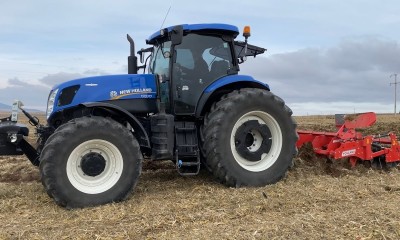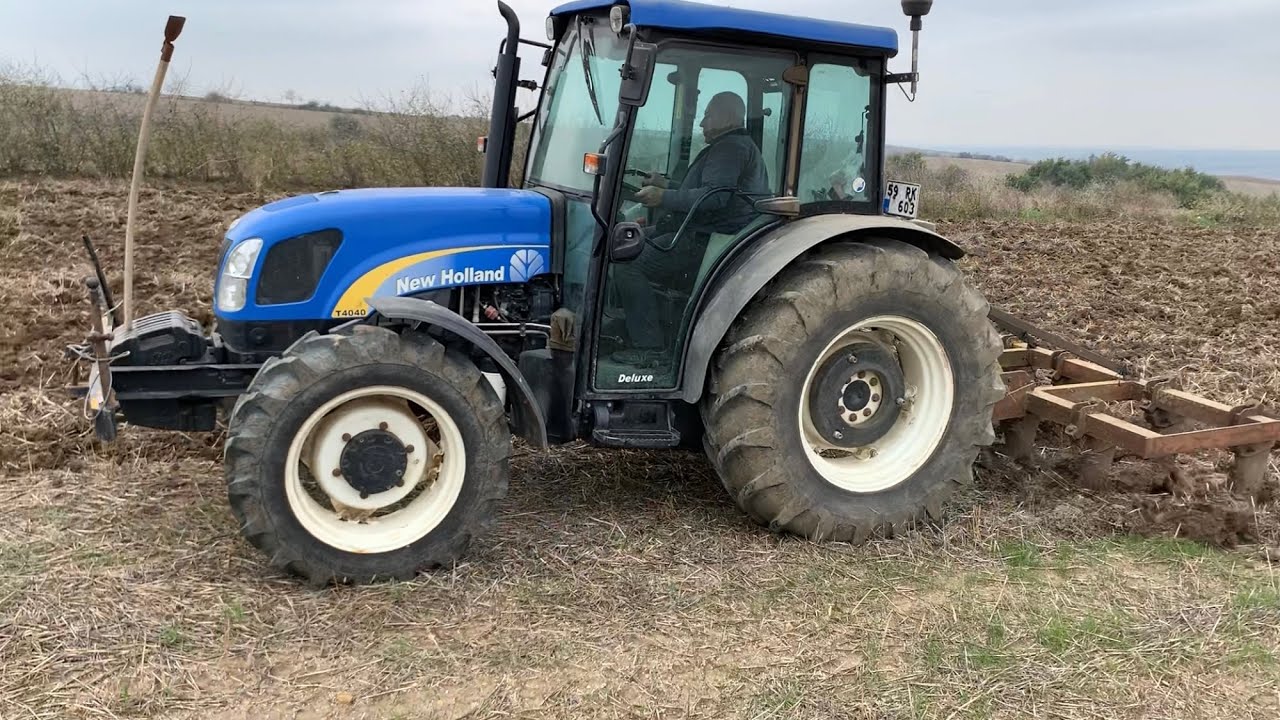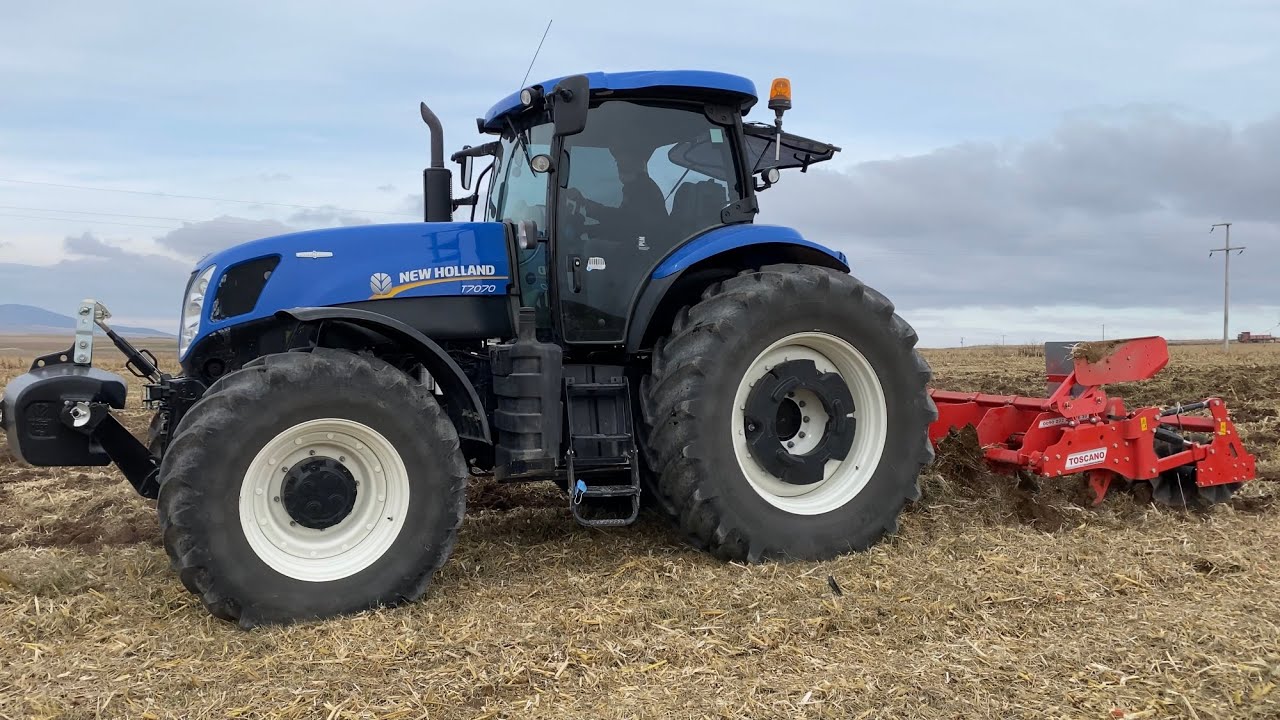New Holland T7040 Kaç Beygir? Full Specs & Pro Tuning Guide

The New Holland T7040 stands as a cornerstone of the highly regarded T7000 series, a line of versatile and powerful tractors manufactured at the Basildon plant in England between 2007 and 2011. Engineered for the rigorous demands of modern agriculture, the T7040 established a reputation as a reliable row-crop tractor, adept at handling a wide array of tasks with exceptional performance and durability. For owners, operators, and tuning professionals, understanding the true capabilities of this machine is paramount.
For those seeking a direct answer to the central question, "New Holland T7040 kaç beygir?" (How many horsepower is the New Holland T7040?), the answer is nuanced. The New Holland T7040 has a rated engine power of 182 hp (134 kW). However, this figure only tells part of the story. The tractor is equipped with a sophisticated Engine Power Management (EPM) system that can intelligently boost the maximum power to 234 hp (173 kW) under specific high-load conditions, such as demanding Power Take-Off (PTO) or high-speed transport operations.
This guide serves as the definitive technical resource for the New Holland T7040. It will first deconstruct the tractor's complex factory power ratings, provide a complete and detailed technical specification sheet, and then explore how professional ECU remapping from HP Chiptuningfiles can safely unlock its true performance potential. This process delivers significant, measurable gains in productivity, tractive effort, and fuel efficiency, transforming an already capable machine into a dominant force in the field.
Deconstructing the T7040's Factory Power: Beyond a Single Number
The array of power figures associated with the T7040 can be perplexing. This is not due to contradictory data but rather a reflection of sophisticated engineering designed to balance efficiency with on-demand power. The manufacturer employs multiple, context-dependent power ratings (Rated, Maximum, EPM, and PTO) that allow the tractor to operate economically under lighter loads while delivering a surge of power when it is most needed. However, this creates a "performance gap" where the machine's full mechanical potential is not always accessible to the operator, particularly during heavy draft work. Professional ECU remapping bridges this gap by creating a new, optimized power curve that delivers superior, consistent performance across all conditions, moving beyond the factory's conditional limitations.
You May Like: Kess V2 Vs V3 Kess3 Guide
The Powerplant: FPT NEF 6.7L Engine
At the heart of the New Holland T7040 is the formidable FPT (Fiat Powertrain Technologies) NEF 6.7L engine. This 6-cylinder, 6.7-liter (
6728 cc or 411 cu. in.) diesel engine is equipped with a turbocharger and intercooler to maximize power density and efficiency. For its era, it featured advanced technology, including a high-pressure Common Rail fuel injection system managed by a Bosch Engine Control Unit (ECU) and a 4-valve-per-cylinder head design. This combination allows for precise fuel metering and combustion control, forming the basis for its impressive power output and torque characteristics.
Rated Power vs. Maximum Power
It is crucial to differentiate between the various power ratings provided by the manufacturer.
-
Rated Power: The most commonly cited figure of 182 hp (134 kW) is the tractor's rated power, which is the output measured at the official rated engine speed of 2200 rpm. This is the standard power available for most continuous operations.
-
Maximum Power: As engine load increases and RPMs are optimized under load, the engine can naturally produce a higher maximum power of 200 hp (147 kW) without any electronic intervention. This represents the peak of the engine's standard power curve.
Read More: Best Roadside Assistance USA 2025
Engine Power Management (EPM) Explained
The key to understanding the T7040's highest power figures lies in its Engine Power Management (EPM) system, also referred to as "Power Boost". This standard feature is an intelligent ECU function that automatically authorizes additional power when it detects specific high-demand, non-tractive loads. The EPM system activates primarily during PTO operations or when the tractor is in higher gears for transport, ensuring power is available when needed for implements like large balers or for maintaining speed on hilly roads.
When EPM is active, the T7040's power output increases dramatically:
-
The rated power jumps to 218 hp (160 kW).
-
The maximum power surges to an impressive 234 hp (173 kW).
This system is highly effective, but its conditional nature means the full 234 hp is not available for heavy draft work like ploughing or deep cultivation, where it could be most beneficial for increasing tractive effort.
Torque: The True Measure of Pulling Power
While horsepower is a measure of the rate of work, torque is the direct measure of rotational force, or pulling power. The T7040's FPT engine is engineered to be a torque monster.
-
Standard Maximum Torque: In normal operations, the engine delivers a substantial maximum torque of 844 Nm (623 lb-ft) at a low 1400 rpm.
-
EPM Maximum Torque: With EPM engaged, this figure rises to 938 Nm (692 lb-ft) at 1600 rpm.
This high torque output at low engine speeds is what gives the tractor its immense lugging ability. Furthermore, the engine boasts a very high torque rise of 45% (standard) and 35% (with EPM), indicating its capacity to handle sudden increases in load without stalling or requiring a downshift.
You May Like: BMW I8 2014–2020 ECU Tuning Guide
This table consolidates the various factory power ratings into a clear, easy-to-understand format, directly addressing the user's primary question.
|
Performance Metric |
Standard Operation |
With Engine Power Management (EPM) |
|
Rated Power |
182 hp / 134 kW @ 2200 rpm |
218 hp / 160 kW |
|
Maximum Power |
200 hp / 147 kW |
234 hp / 173 kW |
|
Maximum Torque |
844 Nm @ 1400 rpm |
938 Nm @ 1600 rpm |
|
Rated PTO Power |
150 hp / 112 kW |
N/A (EPM activates during PTO use) |
|
Tested Max PTO Power |
179.8 hp / 134.1 kW |
N/A (Represents EPM-like output) |
New Holland T7040: A Complete Technical Specification Sheet
Beyond its impressive engine, the T7040 is a comprehensively engineered machine built for productivity and versatility. This section serves as a complete technical reference, compiling verified data into a single, authoritative guide for workshops, dealers, and owners.
 Transmission and Drivetrain
Transmission and Drivetrain
The T7040 was offered with several advanced transmission options to suit different operational needs.
-
Power Command™: The standard and most common transmission is the robust Power Command™ full powershift, which allows for clutchless shifting through all gears. The typical configuration is 18 forward and 6 reverse gears (18x6).
-
Optional Configurations: For enhanced road performance and fuel efficiency, a 19x6 "Eco" or "Fast Mover" version was available, enabling transport speeds of up to 50 km/h at reduced engine RPM. For specialized, low-speed applications, a
-
28x12 creeper option could be specified.
-
Auto Command™ CVT: Select models were equipped with the Auto Command™ Continuously Variable Transmission (CVT). This sophisticated system provides seamless acceleration and infinite speed selection, allowing the operator to achieve the precise target speed for any task.
-
Drivetrain: The chassis is a standard 4x4 Mechanical Front-Wheel Drive (MFWD) configuration, ensuring maximum traction in all conditions.
Hydraulic System
The T7040 features a high-capacity, modern hydraulic system designed for powerful and responsive implement control.
-
System Type: It utilizes an advanced Closed-Center Load-Sensing (CCLS) system. This design is highly efficient, as it only delivers flow and pressure on demand, reducing parasitic power loss and saving fuel.
-
Pump Capacity: The standard hydraulic pump provides a flow of 32 gpm (121.1 lpm). For operations requiring even higher flow, an optional MegaFlow pump was available, boosting capacity to 39.6 gpm (149.9 lpm).
-
Lift Capacity: The tractor demonstrates immense strength, with a rear 3-point hitch lift capacity of 12,787 lbs (5,800 kg) when measured at the 24-inch point, enabling it to handle large and heavy implements with ease.
PTO (Power Take-Off)
The PTO system is designed for reliability and ease of use, featuring an independent electro-hydraulic engagement for smooth start-up of implements. It offers multiple speed options to match a wide range of powered attachments, including the standard
540/1000 rpm speeds and an optional economy 540E mode for lighter tasks.
Dimensions, Weight, and Capacities
The T7040 is a substantial machine, built with a strong frame to handle heavy-duty work.
-
Physical Size: It has a wheelbase of 113.5 inches (288 cm), an overall length of 189.6 inches (481 cm), and a height to the top of the cab of approximately 10 feet (3 m).
-
Weight: The operating weight varies depending on configuration and ballasting, typically falling between 15,708 and 17,595 lbs (7.1 to 8.0 tons).
-
Fluid Capacities: To support long working days, it is equipped with a large 116-gallon (439 L) fuel tank and a 26.5-gallon (100.3 L) hydraulic system capacity.
This comprehensive table provides a one-stop technical encyclopedia for the T7040, saving professionals valuable time and providing a reliable dataset for service, comparison, and sales.
|
Category |
Specification |
Value |
|
Engine |
Manufacturer / Model |
FPT / NEF |
|
Cylinders / Aspiration |
6 / Turbocharged & Intercooled |
|
|
Displacement |
6.7 L / 411 cu. in. |
|
|
Fuel System |
Bosch High-Pressure Common Rail |
|
|
Emission Level |
Tier III |
|
|
Transmission |
Type |
Power Command™ Full Powershift (Standard) / Auto Command™ CVT (Optional) |
|
Gears (Standard) |
18 Forward x 6 Reverse |
|
|
Hydraulics |
Type |
Closed-Center Load-Sensing (CCLS) |
|
Pump Flow (Standard) |
32 gpm / 121.1 lpm |
|
|
3-Point Hitch Type |
Category II / IIIN |
|
|
Rear Lift Capacity (at 24") |
12,787 lbs / 5,800 kg |
|
|
PTO |
Rear PTO Speeds |
540 / 1000 rpm (plus 540E option) |
|
Dimensions |
Wheelbase |
113.5 in / 288 cm |
|
Operating Weight |
15,708 - 17,595 lbs / 7,125 - 7,981 kg |
|
|
Capacities |
Fuel Tank |
116 gal / 439 L |
|
Hydraulic System |
26.5 gal / 100.3 L |
Unlocking True Potential: Professional ECU Remapping for the T7040
The factory settings of the New Holland T7040 provide a solid foundation, but they do not represent the engine's ultimate potential. For operators and workshops looking to maximize performance, productivity, and efficiency, professional ECU remapping is the key.
The Engine's Brain: The Bosch EDC7 ECU
The FPT engine in the T7040 is governed by a highly sophisticated Engine Control Unit (ECU) from the Bosch EDC7 family, a platform renowned for its reliability and robustness in heavy-duty applications. This ECU is the central computer that precisely manages every aspect of combustion, controlling fuel injection timing, duration, rail pressure, and turbo boost based on real-time data from dozens of sensors. The fact that the T7040 uses this specific ECU is a significant advantage for tuning. The Bosch EDC7 is one of the most widespread and well-understood ECUs in the agricultural and commercial vehicle sectors. This maturity means that professional tuning files are not experimental; they are based on years of development and refinement, ensuring that performance gains are achieved safely and reliably without compromising the engine's inherent durability. This transforms the tuning proposition from a question of possibility to a certainty of reliable enhancement.
The factory software, or "map," loaded onto this ECU is inherently conservative. Manufacturers must create a single calibration that can perform adequately in all global markets, accounting for wide variations in fuel quality, climate, altitude, and maintenance practices. This necessary compromise leaves a significant margin for optimization in the hands of expert tuning engineers.
The Science of a Professional Remap
The process of remapping the T7040's ECU is a precise, software-based procedure that unlocks the engine's hidden reserves.
-
Reading the Original File: A tuning technician uses specialized professional tools, such as K-TAG or New Trasdata, to connect to the tractor's diagnostic port or directly to the ECU on a bench. This allows them to read the complete original factory software file and save it securely.
-
Custom File Modification: This original file is then uploaded to the secure HP Chiptuningfiles portal. Our team of expert engineers meticulously analyzes the software and modifies key data maps. This includes adjusting parameters like torque limiters, injection duration tables, rail pressure targets, and boost pressure curves to create a new, optimized file. This is not a generic "chip" but a fully custom file, tailored to the specific software version of that tractor's ECU.
-
Writing the Tuned File: The technician downloads the new, custom-tuned file from our portal and writes it back to the ECU, overwriting the conservative factory map. The entire process is software-based, requiring no physical modification to the engine.
Stage 1 Tuning Gains: A Data-Driven Projection
A professional Stage 1 ECU remap from HP Chiptuningfiles delivers substantial and immediately noticeable performance improvements, all achieved without any hardware changes. Based on extensive development, operators can expect gains that transform the tractor's character. A Stage 1 tune can safely increase power to approximately 225-235 hp and boost torque to an immense 1000-1050 Nm. These gains are engineered to work well within the safe mechanical limits of the FPT engine and the Power Command transmission, prioritizing long-term reliability.
This table provides a clear, quantifiable "before and after" scenario, allowing workshops to easily communicate the value of ECU tuning to their customers.
|
Performance Metric |
Stock (Standard Max) |
HP Chiptuningfiles Stage 1 |
Difference |
|
Maximum Power |
~200 hp / 147 kW |
~230 hp / 169 kW |
+30 hp (+15%) |
|
Maximum Torque |
~844 Nm / 623 lb-ft |
~1020 Nm / 752 lb-ft |
+176 Nm (+21%) |
The Business Case for Tuning: More Than Just Power
While the increase in horsepower is impressive, the true value of ECU remapping for an agricultural business lies in the tangible improvements to productivity and operational costs.
Increased Tractive Effort & Productivity
The most significant benefit of tuning the T7040 is the massive increase in torque, particularly at low and mid-range RPMs. Torque is directly proportional to tractive effort—the force that actually pulls an implement through the soil. With a 21% increase in peak torque, a tuned T7040 can:
-
Pull wider or heavier implements, allowing more work to be done in a single pass.
-
Maintain a higher ground speed with the same implement, especially in tough conditions like heavy soil or on steep gradients.
-
Reduce wheel slip, as the engine can operate in a more efficient RPM range without strain.
This translates directly into increased productivity. Covering more acres per hour is critical during tight seasonal windows for planting, cultivating, or harvesting, making the investment in tuning pay for itself quickly.
Significant Fuel Economy Improvements
A powerful advantage of professional ECU remapping is the potential for significant fuel savings. This is achieved through the principle of "torque-based efficiency." By optimizing the torque curve, the engine produces more power at lower RPMs. An operator will find that they can perform the same task in a higher gear at a lower engine speed. For example, a task that previously required operating at 2000 rpm in 7th gear might now be accomplished at 1600 rpm in 8th gear. Running the engine at these lower, more efficient speeds directly reduces fuel consumption. Depending on the specific application and operator style, agricultural businesses typically report fuel savings of
5-15%. Over hundreds or thousands of operating hours, this represents a substantial reduction in operational costs and a clear return on investment.
Enhanced Drivability and Operator Comfort
A professionally tuned engine offers far more than just raw power. The remap results in smoother power delivery, sharper throttle response, and a wider, more flexible powerband. This makes the tractor easier and more pleasant to operate, especially over long working days. The reduced need for frequent gear changes and the engine's ability to effortlessly handle loads contribute to lower operator fatigue, which in turn helps maintain high levels of productivity and safety.
Why a Custom Tuning File is Non-Negotiable for Professional Results
The world of engine tuning is filled with options, but not all are created equal. Stories of catastrophic engine failures, such as a combine engine incurring a $100,000 repair bill after being "chipped," are a stark reality in the industry. These incidents create a valid fear of tuning, but it is crucial to understand the technical distinction between amateur, high-risk "chips" and professional, custom-engineered ECU remapping. This distinction is the key to unlocking performance safely.
The Dangers of Generic "Chips" and Off-the-Shelf Files
The vast majority of tuning-related engine damage is caused by low-quality, generic solutions. These can be physical "tuning boxes" that plug into sensors to trick the ECU, or poorly developed, "one-size-fits-all" software files. The fundamental flaw in these products is their lack of specificity. A generic file is created for a vehicle model, not for an individual vehicle. It cannot account for:
-
The exact software and hardware version of the tractor's ECU.
-
The specific wear and tear, and operating condition of the engine.
-
Variations in injectors, turbochargers, or fuel pumps.
This lack of precision can lead to dangerous operating conditions, such as incorrect air-fuel ratios, excessive exhaust gas temperatures, or turbo over-boosting, which can cause severe and costly engine damage.
The HP Chiptuningfiles Difference: Safety and Reliability Through Customization
At HP Chiptuningfiles, we reject the generic approach. Every single tuning file we deliver is 100% custom-made, built upon the original software read from the specific vehicle being tuned. This process ensures perfect compatibility and eliminates the risks associated with generic files.
Our expert engineers develop these files using data from dynamometer testing, which allows us to precisely measure the effects of our modifications. This means we can optimize performance to its peak while guaranteeing that all parameters remain within the safe mechanical tolerances of the engine, transmission, and drivetrain components. Our primary goal is to enhance performance while preserving—and often improving—long-term reliability.
Addressing the Warranty Concern
It is important to be transparent: any modification to a vehicle's ECU software can potentially void the manufacturer's warranty. However, unlike physical hardware modifications, a professional ECU remap is completely digital and reversible. The original, unmodified factory file is always saved. Before any dealer service or warranty claim, this stock file can be written back to the ECU, effectively returning the tractor to its factory state and leaving no trace of the modification.
Partner with HP Chiptuningfiles: Grow Your Agricultural Tuning Business
For professional workshops, mechanics, and agricultural machinery dealers, offering ECU remapping is a high-value service that can significantly expand your business. By partnering with HP Chiptuningfiles, you gain a competitive edge, providing your customers with safe, reliable, and powerful performance enhancements.
A B2B Partnership for Workshops and Dealers
Partnering with HP Chiptuningfiles gives you immediate access to our extensive tuning file database. We provide thousands of high-quality, dyno-tested, and custom-developed tuning files for a vast range of agricultural machinery, including the full New Holland T7000 series.
Our Simple 4-Step Process
Our platform is designed for professional use, making the tuning process fast, simple, and efficient.
-
Create a Free Account: Register on our user-friendly platform to get instant access.
-
Purchase Credits: Our flexible and affordable credit system allows you to buy tuning files as you need them, with no subscriptions or hidden fees.
-
Upload the Original File: Use your tuning tool to read the original ECU file from your customer's T7040 and upload it to our secure online portal.
-
Download the Tuned File: Our expert engineering team will create a custom-tuned file based on your specifications and make it available for download, often within the hour.
More Than Just Files: Hardware and Support
We are a complete partner for your tuning business. In addition to our world-class files, we also supply the professional tuning hardware and tools required to read and write ECU files. Furthermore, our dedicated technical support team is always available to assist with any questions or challenges you may encounter.
Ready to offer your customers the best in agricultural performance tuning? Create your professional account today and explore the power of custom-tuned files from Europe's leading provider.
Frequently Asked Questions (FAQ)
Q1: What is the exact horsepower of a New Holland T7040? A: A stock New Holland T7040 has 182 rated horsepower. With its standard Engine Power Management (EPM), it can produce a maximum of 234 horsepower for PTO and transport tasks. A professional Stage 1 ECU tune can consistently provide around 230 hp across all operations.
Q2: Is ECU remapping safe for my T7040's FPT engine? A: Yes, when performed by a reputable provider using a custom-developed file. The FPT 6.7L engine and Bosch EDC7 ECU are very robust. Our custom tuning files are engineered to increase performance while operating within the safe mechanical tolerances of the engine and drivetrain, prioritizing long-term reliability. We avoid the risks associated with generic, one-size-fits-all "chips."
Q3: How much fuel can I realistically save by tuning my T7040? A: Agricultural operations typically see a fuel efficiency improvement of 5-15%. The increased torque from tuning allows the engine to perform the same work at lower RPMs, which directly reduces fuel consumption.
Q4: Will tuning my tractor void its warranty? A: Modifying the ECU software can void the manufacturer's warranty. However, our ECU remapping process is completely reversible. The original factory file can be written back to the ECU before any dealer service, leaving no trace of the modification. We can provide more information if you contact us.
Other news and updates

Read more OBD Breakthrough: Tuning Support for the Continental ASG1 ECU in Audi e-tron & Porsche Taycan
The Continental ASG1 ECU used in the Audi e-tron and Porsche Taycan is now fully supported for OBD read/write. This breakthrough allows safe tuning of torque limits, current maps, thermal strategies and pedal response, enabling measurable performance gains whi...
Read more

Read more Stage 1, Stage 2, and Stage 3 Tuning: Which One Is Right for You? | HP Chiptuning Files Europe & UK
Discover the differences between Stage 1, Stage 2, and Stage 3 tuning. Learn which remap is best for your car, driving style, and budget at hp-chiptuningfiles.com.
Read more

Read more Mercedes-AMG G63 2025: ECU Remap & Performance Boost
Hey, we are HP Chiptuningfiles – Europe’s leading ECU tuning file service provider. We deliver custom, dyno-tested tuning files for diesel, petrol & hybrid engines, trusted by 4,000+ clients worldwide. The 2025 Mercedes-AMG G63 combines iconic G-Class ruggedne...
Read more